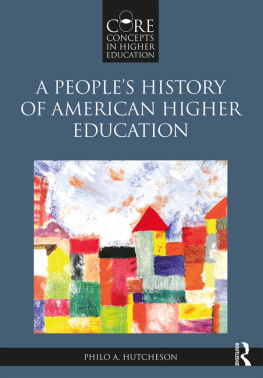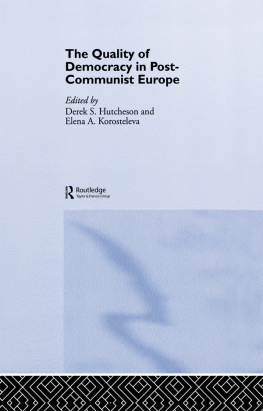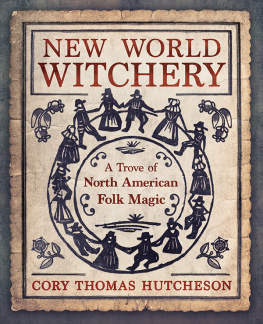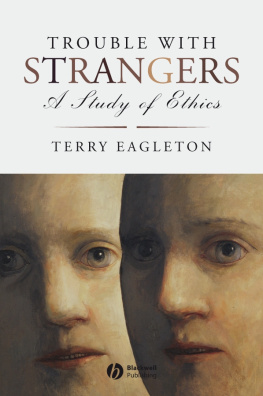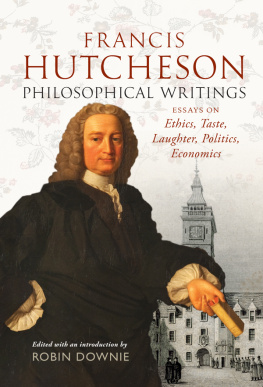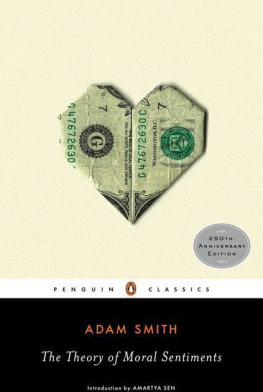Title page
Francis Hutcheson
Selected Philosophical Writings
Edited and Introduced
By John McHugh
IMPRINT ACADEMIC
Publisher information
Copyright John McHugh, 2014
The moral rights of the author have been asserted. No part of this publication may be reproduced in any form without permission, except for the quotation of brief passages in criticism and discussion.
Originally published in the UK by Imprint Academic PO Box 200, Exeter EX5 5YX, UK
Originally distributed in the USA by Ingram Book Company, One Ingram Blvd., La Vergne, TN 37086, USA
2014 digital version by Andrews UK Limited
www.andrewsuk.com
Full series details:
www.imprint-academic.com/losp
Series Editors Note
The principal purpose of volumes in this series is not to provide scholars with accurate editions, but to make the writings of Scottish philosophers accessible to a new generation of modern readers in an attractively produced and competitively priced format. In accordance with this purpose, certain changes have been made to the original texts:
- Spelling and punctuation have been modernized.
- In some cases the selections have been given new titles.
- Some original footnotes and references have not been included.
- Some extracts have been shortened from their original length.
- Quotations from Greek have been transliterated, and passages in languages other than English translated, or omitted altogether.
Care has been taken to ensure that in no instance do these amendments truncate the argument or alter the meaning intended by the original author. For readers who want to consult the original texts, full bibliographical details are provided for each extract.
The Library of Scottish Philosophy was originally an initiative of the Centre for the Study of Scottish Philosophy at the University of Aberdeen. The first six volumes, published in 2004, were commissioned with financial support from the Carnegie Trust for the Universities of Scotland. In 2006 the CSSP moved to Princeton where it became one of three research centers within the Special Collections of Princeton Theological Seminary Library, and with the Seminarys financial support more volumes have been published. Selections from Francis Hutcheson is the sixteenth volume in the series and has been prepared for publication by Alexander Peterson and Jeremiah Barker, to whom a special debt of gratitude is owed.
Acknowledgements
The CSSP gratefully acknowledges financial support from the Carnegie Trust and Princeton Theological Seminary, the enthusiasm and excellent service of the publisher Imprint Academic, and the permission of the University of Aberdeen Special Collections and Libraries to use the engraving of the Faculty of Advocates (1829) as the logo for the series.
Gordon Graham,
Princeton, March 2014
Editors Acknowledgements
This anthology would not have been possible without the hard work of Jeremiah Barker and Alex Peterson, who turned a pile of facsimiles of Hutchesons 18th-century texts into the manuscript for the book you are about to read. Also making essential contributions were Noah Bradtke-Litwack, Moriah Ellenbogen, Kristin Edwards, and Christina Hambleton. The same goes for Graham Horswell and the staff at Imprint Academic.
I would like to thank Gordon Graham for providing me with the wonderful opportunity to work on this anthology. I would also like to thank Denison University for funding my trip to the February 2012 Center for the Study of Scottish Philosophy conference at which I had the good fortune to meet Gordon.
Lastly, I would like to thank Aaron Garrett for introducing me to the work of the great Francis Hutcheson.
Introduction
John McHugh
Hutchesons Life
Francis Hutcheson was born in 1694 into a community of Scots Presbyterian transplants to the Ulster province of Northern Ireland.
Almost immediately upon his return to Ireland, Hutcheson was invited to run a new Dissenting Academy in Dublin (such schools were established for members of Protestant sects, like Presbyterianism, that dissented from the tenets of the official Church of England). While in Dublin, he became friends with the liberal-thinking Lord Viscount Robert Molesworth (1656-1725). Association with Molesworth and his circle of similarly-minded friends undoubtedly nourished the New Light tendencies already present in Hutchesons thinking. Perhaps the most significant contribution that Molesworth made to Hutchesons intellectual development was to encourage him to study the writings of Anthony Ashley-Cooper, 3rd Earl of Shaftesbury (1671-1713). Shaftesburys attempt to ground morality directly in human nature instead of in divine law had a dramatic impact on Hutchesons own philosophy, which he introduced to the public through four brief treatises he composed and published during this period.
The first two were published together in 1725 as An Inquiry into the Original of Our Ideas of Beauty and Virtue ; the second two were published together in 1728 as An Essay on the Nature and Conduct of the Passions and Affections, with Illustrations on the Moral Sense . Around this time, he also composed and published in the Dublin Journal two series of essays, the first attacking Thomas Hobbes (1588-1679) attempt to explain the phenomenon of laughter in purely egoistic terms and the second attacking Bernard Mandevilles (1670-1733) argument that the economic prosperity of a nation requires widespread vice among its citizens. Additionally, while in Dublin, Hutcheson might have written or at least started writing, in Latin and thus primarily for the use of his students, A Compend of Logic , A Synopsis of Metaphysics , and A Short Introduction to Moral Philosophy . Precise composition dates for these texts are unknown; the latter two were both eventually published in 1742, while the first was published posthumously in 1756.
The reputation boost Hutcheson received from the writings he published while in Dublin surely contributed to the University of Glasgows 1730 decision to offer him the position of Professor of Moral Philosophy, which was left vacant after the death of his former teacher, Gershom Carmichael (1672-1729). Hutcheson accepted the position and held it until he died in 1746. While at Glasgow, he completed a manuscript of A System of Moral Philosophy , which was published in 1755 by his son Francis and his student-then-colleague William Leechman (1706-1785). Working with another colleague, James Moor (1712-1779), Hutcheson also completed and published an English-from-ancient-Greek translation of Marcus Aurelius Meditations . The rest (perhaps most) of his energy went into fulfilling his professorial duties. (Hutcheson indicates in his correspondence that he had little time for writing while at Glasgow. With the exception of the translation, most of the literary work he did there, including that on the System , further developed ideas already laid out in his Dublin writings and/ or presented in his lectures.)
Leechmans biographical preface to the System provides a vivid, first-hand account of Hutchesons character both as a teacher and a human being. We learn from Leechman that Hutcheson aimed at morally inspiring his students as much as, if not more than, he did at improving their grasp of the abstract arguments and positions he taught them in theology, ethics, jurisprudence, and political philosophy. As the selections in this anthology show, Hutchesons writing tends to be careful and rigorous. But in his lectures, which he delivered in English rather than in the customarily-used Latin, Hutcheson was often willing to sacrifice technical precision for rhetorical force and practical application (xxxiv). Leechman reports that Hutchesons descriptions of the virtuous life were so engaging that students advanced in years and knowledge, chused to attend his lectures on Moral Philosophy, for four, five, or six years together, still finding fresh entertainment, though the subject was in the main the same every season (xxxiii-iv). Yet he did not merely moralize. He also inculcated such an ardor for knowledge and spirit of inquiry in his students that their casual conversations often turned with great keenness upon subjects of learning and taste (xxxvii).
Next page

